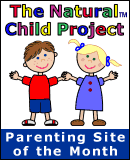| How
do I talk to my children about the importance of good food in ways
that they can understand? You
have to talk to children at the level they are on intellectually.
When three-year-olds and four-year-olds come in for their checkup,
we talk about how they can grow bigger and stronger muscles if
they eat vegetables and spaghetti and fruit. I tell them that
if they eat cookies and candies and greasy foods, they won't be
able to jump and play the way they'd like. At home, the parents
can then build on "what the doctor told you."
A couple of years
later, I talk about specific activities that the child may like
such as baseball, soccer, swimming, or whatever. Then I ask, "Do
you think you'll be able to run and kick better if you eat French
fries and milkshakes or if you eat vegetable and fruit?"
They have no trouble coming up with the right answer. We talk
about which fruits and vegetables are their favorites, and I assure
them that eating those vegetables is just the right thing to do
if you want to be the best player on the team. I stress the fact
that they're "big kids now" and they know better than
to eat sweets and meat. I say, "Only little kids think that's
good for you!" I also encourage them to eat backwards once
in a while. Have cereal for dinner, and spaghetti for breakfast.
It's fun, and it makes the day's meals more interesting.
It's effective
to put mental pictures in a child's head. I call fast food hamburgers
"greaseburgers" and refer to cheese as "chunks
of fat." We describe how butter looks if you leave it in
the hot sun so it gets "all gushy." Ask your six-year-old
if he'd want to rub that greasy butter all over his face and hair.
Of course, he wouldn't. So explain that's just what he's doing
when he eats a hamburger and fries, only he's rubbing it on the
inside. Yuck!
As the child gets
older, we talk about "brain food" and the benefit to
his grades if he eats the right way.
If you have teenagers,
you can talk about how they look. Kids who eat lowfat, low-sugar
vegetarian meals don't have acne, sallow skin, or greasy hair.
They look vibrant and alive. They are full of energy and can really
enjoy school and extracurricular activities. No one wants a date
who's covered in makeup to hide bad skin and who's too tired from
an unhealthy diet to enjoy several hours of dancing.
Remember, use examples
with immediate rewards. Young people don't think in terms of tomorrow.
They live and breathe for today. They're more interested in the
benefits at 15 than 50. |



